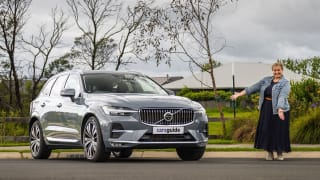
Top 5 things to look for when buying a camper-trailer

So, you’ve made the decision to upgrade from a swag or tent to a camper-trailer, but the sheer volume of makes and models from which to choose is giving you a massive headache? No fear. Because to cut through all of the confusion, and to help make sense of the dizzying array of campers available, here are our top-five ways to buy the best camper-trailer for you.
Read on so you can head bush as soon as humanly possible.
Price

This is an easy one. As for any major purchase, if you work out how much you’re willing and able to spend before you start looking and researching in earnest, that will help no end to narrow your search and thin the field of potential buys, thus making your job of tracking down one of the campers you’ll likely buy so much easier.
If your budget tops out at $10,000 you’ll be mostly looking at used camper-trailers and a few rather basic new campers.
Above $10,000 and your camper options grow quite a bit more, with many new models available across a variety of styles and equipment levels. The bonus here is that you’re safe in the knowledge that your camper has never been used before.
From $20,000 and beyond, your camper horizon expands a great deal with regards to build quality and standard features – and there are plenty of campers stretching past $40,000 with unreal attention to detail, fantastic design, supremely practical features and hard-core off-road suspension.
Suitability

Buy to suit your lifestyle and your current family set-up, whether it be as a couple or family. And buy a camper to match your tow vehicle. Think about it: it’s no good buying a 2500kg off-road caravan if you have a Yaris hatchback.
If the most challenging trip you ever plan to do in your camper will be driving in dry weather along a well-maintained gravel road to a national park campsite, which has a bitumen carpark, then there’s really no need for you to buy a bush-ready camper with stone guards, chequer-plate everywhere, and dual-shock, airbag suspension. You should aim for something like a pop-top touring-style camper with road-suited tyres and suspension.
However, if you do intend to take your camper on anything tougher than dirt roads, then it’s a great idea to make sure you’re as prepared as possible, so get something purpose-built for the rough and tough trips you have in mind: think off-road tyres and suspension, as well as a greater degree of dust-sealing efficacy, robust build quality and extra ground clearance.
In other words, buy a camper that will suit you and your intended purpose for it.
Same goes for accommodation; it’s no good buying a camper that comfortably sleeps four people (two adults, two kids) if you’re a happy couple with no plans to have children just yet. In that case, an entry-level lightweight camper which sleeps two people will suit you both well for a fair few years to come. You can upgrade when the time is right.
Build Quality

This is of the utmost importance, even if you don’t intend to take your camper on any rough roads. High-quality fit and finish, design, engineering and build quality are worth the extra money, no doubt about it.
While it’s tempting to buy a dirt-cheap brand-new camper and then shower yourself in the money you’ve saved not buying a more expensive version, that decision will likely come back to bite you on the arse.
The same principle applies to buying a camper as it does when making any purchase: spend more cash to buy something that’s been well designed and made and you’ll ultimately spend less cash – on maintenance, repair or replacement of parts – during your period of ownership.
Standard Features

Your potential new camper purchase should be chock-full of standard gear already onboard in readiness for your first trip away, rather than you having to rely on buying a stack of options to make your camper life do-able.
Don’t get me wrong, it’s great for a camper-trailer to have an extensive list of extras because that gives you the flexibility to modify and add-on to your adventure set-up as you see fit and as your finances allow, but you don’t want to head off on a family trip only to realise 500km away from anywhere that you didn’t opt in for the very thing you assumed was a standard feature anyway, such as a tropical roof, canvas walls for your awning, folding solar panels, or even hot water.
Before your throw any money down, do your research, ask around, ask the sales person and check, check, check.
After-sales Suport

A camper-trailer can be, to the novice at least, quite a sophisticated bit of kit. There are many moving parts - sometimes winches, sometimes winder handles, slides and drawers and electrical wiring and much more – and the operation, maintenance and repair of a camper can be a little daunting at first.
As well as a decent warranty – five years structural warranty is good; a lifetime for a winch – and roadside assistance, your camper-trailer purchase must have strong customer support. The people you buy from need a solid knowledge of their products and ready access to the mechanical and technical expertise to get you back on the road if something does go wrong with it after you have bought it. Common sense? Sure, but something people tend to forget when they become dazzled by new gear and the potential for grand adventures.
Take your time to ask questions and demand high-quality after-sales support. Chances are you won’t need it – well, much – but better to have it and not need it … etc etc. You know what I mean.










Comments